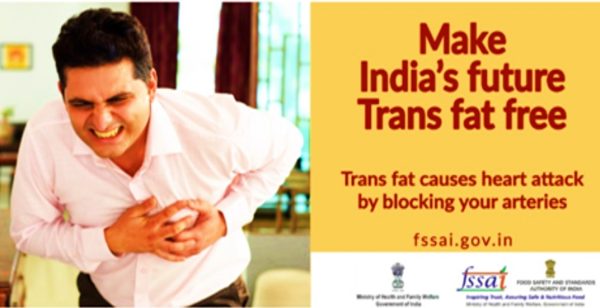
TRANS-FAT FREE INDIA@75 BY 2022
Healthy citizens makes a nation, healthy nation brings the best in everything and takes country in right path. To be healthy, it is important to eliminate certain foods from our diet, eventhough we love to eat those foods. Trans fats are common fats in fried items, re-heated oils and in bakery items. Trans fats are not good for health. Consuming trans fats can result in health issues. India is trying to achieve its goal of eliminating trans fat this year under “Freedom from Trans fat Fat @75” while marking 75th year of Independence. How to eliminate trans fats and how to include healthy fats in our diet? Eat right India sponsored by Government of India (FSSAI) has answers for your questions – Healthy Life
Recognizing the health hazards associated with consumption of industrial trans fats, FSSAI intends to eliminate trans fat from the diet in a phased manner by 2022. Therefore, FSSAI has employed two-pronged strategies to achieve its goal of “Freedom from Trans Fat @75.”
Trans fats are bad fats, which should not be consumed as part of our diet.They are the worst type of fats as they raise the bad cholesterol [Very low density lipoprotein (VLDL) and low density lipoprotein-cholesterol (LDL-c)] and lowers the good cholesterol [high density lipoprotein-cholesterol (HDL-c)] in our body. Trans fats have been linked to heart diseases, overweight/obesity, high blood pressure, diabetes and some types of cancers.
The sources of trans fat can be (1) Natural or (2) Artificial. Natural trans fats are also called ruminant trans fats, as they are present in small quantities in meat and dairy products obtained form ruminant animals such as cows, sheep and cattle. Natural/ruminant trans fat are not generally considered harmful.
Artificial trans fat are also called industrial trans fat as they are manufactured industrially by a chemical process of partial hydrogenation or thermal treatments of edible oils containing unsaturated fatty acids, e.g. refining of vegetable oils and during the process of frying. They are generally considered harmful. Artificial/industrial trans fat are present in large quantities in partially hydrogenated vegetable fats (vanaspati, margarine and bakery shortenings). In prepared foods, trans fats are found in:
- Bakery products: Biscuit, fan, rusk, cake etc.
- Fried foods: Bhatura, poori, pakora, bhujiya, fried savoury mixtures (namkeens) etc
- Re-heated oils: Small amounts of trans fats are also formed when the same cooking oil is used for repeated frying; not only at commercial outlets but even at household levels.
Recognizing the health hazards associated with consumption of industrial trans fats, FSSAI intends to eliminate trans fat from the diet in a phased manner by 2022. Therefore, FSSAI has employed two-pronged strategies to achieve its goal of “Freedom from Trans Fat @75.”
On the supply side, FSSAI has notified several crucial regulations to regulate trans fat in industrial products, encouraged edible oil industry and food business operators to eliminate trans fat from their products.
On the demand side, FSSAI has launched a mass media campaign “Heart Attack Rewind”- a 30-second Public Service Announcement (PSA) with the aim to create awareness about the harmful effects of trans fat by,
- Reducing acceptability of industrially produced (IP) trans fat in foods
- Building public support for government action to eliminate IP trans fat and
- Leading consumers to the FSSAI website to seek more information about trans fat
Ways to avoid trans fat
When cooking at home
- Avoid using “Vanaspati” ghee for any kind of cooking.
- When deep frying the foods (Poori/pakora etc.), do not heat the oil for a very long time. Prefer to not leave the food in the oil for a very long time.
- Do not reheat the oil or re-use the same oil for frying. The oil which has once been used for frying can be used for the preparation of vegetables, curries, dals etc.
- Use smaller vessel (kadhai, etc.) at home for deep frying. This will allow you to do frying using a lesser amount of oil/fat.
- Limit the consumption of baked/processed foods like biscuit/fan, cake, chips, fried savoury mixtures (namkeens, etc.).
Tips & Warnings: Small amount of trans fat occurs naturally in meat and diary products, so choose lean cuts of meat and low dairy products.
While shopping for groceries
- Check the Nutrition fact panel on packaged food items for TFA content, if it mentions TFA content more than 0.2 gram per serving then avoid the product and search for some healthy substitute.
- Sometimes the Nutrition fact panel on the food product does not mention the word Trans fatty acid/Trans fat, in such cases always check the ingredient list on the packaged food for the words like “shortening” or “partially hydrogenated vegetable oil”, these contain high amount of trans fats. If it is mentioned then avoid the product and choose a healthier alternative.
Tips & Warnings: Small amount of trans fat occurs naturally in meat and diary products, so choose lean cuts of meat and low dairy products.
When eating out or ordering food from outside
It might be easy to control what you cook in your home to eat, but when eating at a restaurant try controlling the TFA intake by doing the following:
- Ask the owner/server regarding the type of fat/oil being used for preparing the food.
- Avoid foods that are prepared/ fried in vanaspati or margarine.
- Avoid consuming commercial fried foods like fried aloo chaat, french fries samosa, bhatura etc. prepared in Vanaspati. They are also high in fat.
- Avoid baked/processed foods like cookies, chips, cake’s and patty.
Tips & Warnings: Small amount of trans fat occurs naturally in meat and diary products, so choose lean cuts of meat and low dairy products.
Reference: https://eatrightindia.gov.in/EatRightIndia/trans-fat-free-india.jsp
Author: HealthyLife | Posted on: January 17, 2022
« Story of a Little Boy Namely Hope Tamarind Maniac Mr. Khader, A Grassroots innovator from Karnataka selected for Padma Shri for Year 2022 »






















Write a comment